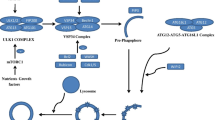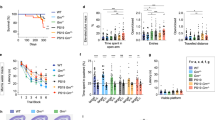Summary.
A critical role for transglutaminase [TGase] has been hypothesized in the pathogenesis of the CAG trinucleotide repeat diseases, characterized by proteins with abnormal expansions of a polyglutamine domain. In the last few years the involvement of TGase in neurodegenerative diseases [NDS], including its role in aggregate formation, has been broadened to include Alzheimer’s [AD] and Parkinson’s Disease [PD]. It is clear that reduction of TGase activity is beneficial for prolonged survival in mouse models of NDS. The pathological progression of these diseases might reflect in part increases of TGase induced aggregates, or changes in other pathways influenced by increases in TGase activity. Neurodegeneration may be influenced by increased TGase activity affecting apoptosis, modulation of GTPase activity and signal transduction. This review will focus on the leading hypotheses in relation to both old and new experimental results.
Similar content being viewed by others
Author information
Authors and Affiliations
Rights and permissions
About this article
Cite this article
Karpuj, M., Steinman, L. The multifaceted role of transglutaminase in neurodegeneration: Review article. Amino Acids 26, 373–379 (2004). https://doi.org/10.1007/s00726-004-0082-8
Received:
Accepted:
Published:
Issue Date:
DOI: https://doi.org/10.1007/s00726-004-0082-8




